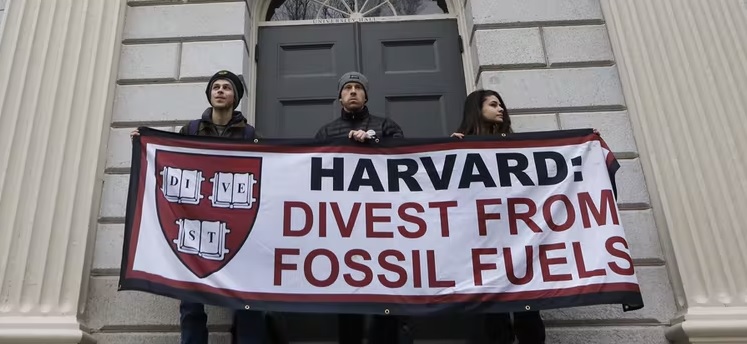
Fossil Fuel Divestment
From The Iowa Source, July 2015
Social change happens only when we shift the fundamental stories we tell each other, shift the values we decide to hold dear, and shift the risks we are willing to take.
Gandhi and Martin Luther King pioneered world-shaking tools for fostering social change, in their programs of non-violent resistance. Another tool that turns a bright light on entrenched social problems is the divestment campaign. In the 1970’s a worldwide push to divest from companies doing business in South Africa raised awareness about the horrors of apartheid. Today a growing movement has arisen to urge divestment from the fossil fuel industry, to highlight the urgent dangers of climate change. Hundreds of cities, universities, foundations and other organizations have committed to divest from the top 200 fossil fuel holders. Leading the way, in a spectacular reversal, was the Rockefeller Brothers Fund (the family that made its fortune as Standard Oil), which declared its divestment during the People's Climate March last September.
This movement became personal for me when a senior official from Harvard stopped by my wife’s office to explain why academic institutions should not divest. Because he spoke for my alma mater I investigated, and found that the points he raised followed closely an official statement made by Harvard President Drew Faust in 2013. A paraphrased summary of her arguments throws into stark relief the nature of the hard moral choices we all have to make:
We have an obligation to maximize our financial return. If fossil fuel companies offer us good profits, we cannot refuse to invest in them.
This is a heartless position, making investment choices immune to the demands of morality. Divestment advocates, in contrast, believe that we should reject any "obligation" that makes us sidestep our humanity for the sake of our profits. Climate change is a terribly serious threat to the well-being of human society; everything is at stake. A percentage point or two on some bottom lines, if it even it amounts to that, is something the world can deal with; widespread climate chaos is not.
Divestment will have negligible financial impact. Other investors will buy any shares we sell.
Divestment is a moral act more than a financial one. The pressure it exerts is not from sold shares but from declared values. It raises public awareness about the fact that we cannot burn most of the fossil fuel we have already discovered without deeply imperiling the planet. If awareness rises sufficiently, energy companies will succumb to growing pressure to reinvent themselves.
We are not a political organization. We serve society in a different way.
How often do we hear people say, "I'm not really a political person?" No one can escape the realities of politics or the demands and responsibilities it puts on us — one can only refuse to engage. A University or a city government has its own specific scope and mission, but it is part of a wider political whole, and the service it provides in one area does not eliminate its broader responsibilities. It has a strong voice that can be raised when circumstances require it. What we need now is raised voices from every corner and level of society.
It is hypocritical to divest. We rely on fossil fuels.
People criticize Al Gore, Bill McKibben, and Naomi Klein for flying around the world in the fight for climate awareness. "How can you talk about protecting the atmosphere when you spew so much carbon yourself?" But this is the height of absurdity, to say that until we have successfully removed fossil fuels from our society no one should take action to eliminate these fuels. The fact that we are all embedded in a fossil fuel economy, with little or no choice about that, does not mean that we cannot see its dangers and do all we can to fight for a different and safer future. We act from where we are today, mixed as our circumstances may be.
Harvard faculty members have created an organization, now with almost 300 signatories, to fight the position of their administration. They quote Theodore Hesburgh, former president of Notre Dame: "We cannot urge students to have the courage to speak out unless we are willing to do so ourselves." Harvard students have now been arrested for the protests they have staged. The same struggle is playing out on campuses and in boardrooms around the world.
The anti-divestment position is morally anemic. It prioritizes the minimization of financial risk while washing its hands of grave planetary risk. At a time when raising our voices is the most important thing we can do, divestment is a bold, public, and necessary form of leadership.
